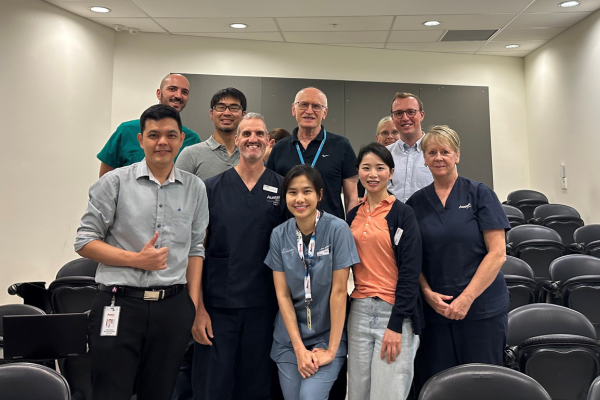About
About
New study on Angiotensin II: A potential game-changer in shock treatment
- Home
- About
- Latest news
- New study on Angiotensin II: A potential game-changer in shock treatment

2 December 2024
In our relentless pursuit to improve the care of critically ill patients, we are conducting a groundbreaking study on the use of Angiotensin II as a primary treatment for shock.
Typically, patients with shock are treated with drugs like noradrenaline and vasopressin to maintain blood pressure. Angiotensin II is currently used as a rescue drug, a last resort when other shock treatments fail.
The new study, led by Professor Rinaldo Bellomo, proposes using Angiotensin II as the primary treatment from the start.
One of the significant advantages of Angiotensin II is its lower side effect profile compared to other medications such as noradrenaline and vasopressin. Noradrenaline can cause heart injury, irregular heart rhythms, and undesirable effects on the immune system; and Vasopressin can negatively impact blood flow to the liver and gut. Angiotensin II does not have these or any other known side effects, making it a promising alternative for treating shock.
“By using Angiotensin II from the beginning, we aim to improve patient outcomes and reduce the risks associated with current treatments,” shares Professor Bellomo.
“We are conducting a multi-centre study and have already enrolled over 80 patients, with a goal of reaching 200 to ensure sufficient statistical power. This study is a collaborative effort, led by the Intensive Care Unit at Austin Health. It involves several hospitals and intensive care units both in Australia and overseas. We are also collaborating with a molecular biology lab at Harvard University to study the effects of Angiotensin II on white blood cells and their ability to kill bacteria,” adds Professor Bellomo.
Angiotensin II has been approved by the Food and Drug Administration (FDA) in the United States and the European Medicines Agency. It has not yet been approved by the Therapeutic Goods Administration (TGA) in Australia.
To support this vital research, we welcome donations. Your contributions will help us involve more centres in the trial, which will result in more participants being recruited for the study, ultimately bringing this potentially life-saving treatment to more patients faster.
To support this study and help us advance critical care, please get in touch with our Foundation team via phone (03) 9496 5753 or email foundation@austin.org.au.


